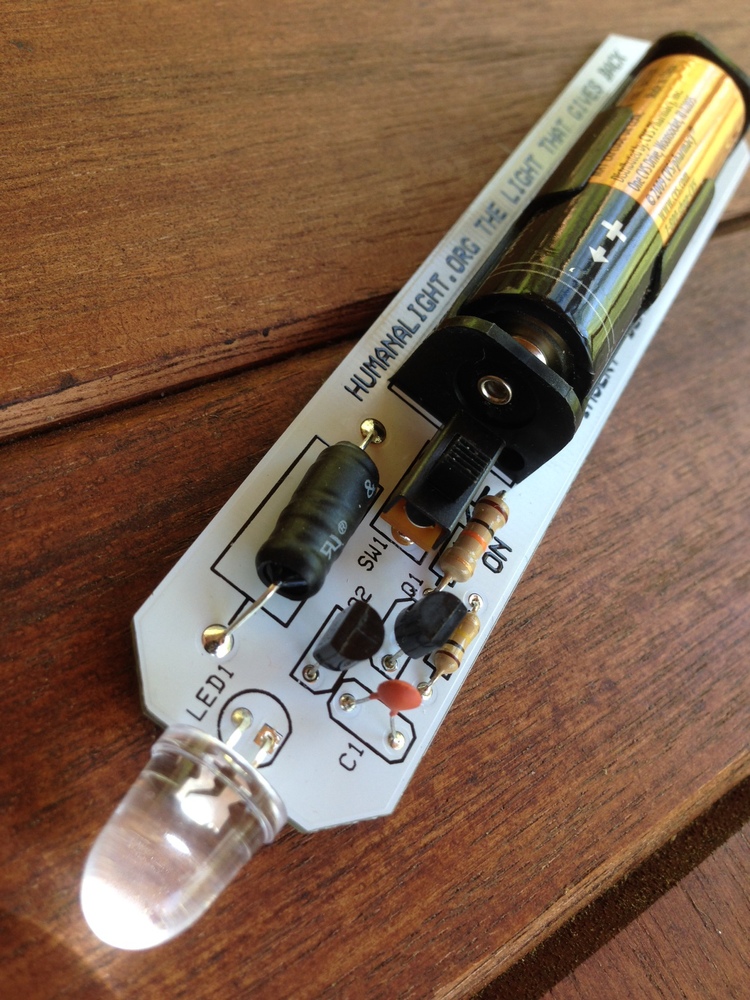If you’ve been an SWLing Post reader for long, you probably know that I’m the founder and director of Ears To Our World (ETOW), a charity built on the belief that access to information is access to education. And that access is achieved, of course, via radio: self-powered radios distributed to schools and communities in remote, impoverished regions throughout the world. ETOW is my passion; we see tangible results come from this practical, simple mission.
Even if you’re familiar with ETOW, most likely you’ve never heard of the HumanaLight because it’s a new product, and we haven’t been selling it for long. If you’re interested, click here to find out…
What is the HumanaLight?
At ETOW, we receive feedback from the teachers, children, and communities where we regularly work; through them, we’ve learned how important the little LED lamp on our self-powered radios is, especially in communities that live largely or entirely off-grid. At the same time, because there is often a glut of used-up batteries (and other trash) in the communities we serve, I wanted to find a way to recycle this waste product.
I realized this might be a good opportunity for an innovative LED flashlight that would offer longevity, shining longer than flashlights that can be purchased locally. Inspired by the Joule Thief, a simple flashlight circuit that cleverly allows light to be produced from a depleted or “dead” AA battery, I wondered if the design could be made even more efficient, and even easier to build…perhaps easy enough for a school-age child to build?
I contacted ETOW volunteer engineer, Gregory Majewski, who immediately set to work on the HumanaLight project. His goal: to make a bright, highly-efficient LED flashlight that could be easily built from common, inexpensive electrical parts, and powered by either new (or used) batteries. And what did this talented engineer deliver? The HumanaLight.
Greg’s HumanaLight design was astonishing: it produced light–continuously, meaning, without being turned off at all–for two full weeks on a depleted cell. A fresh battery yielded four full weeks of usable light. The original HumanaLight prototype (affectionately known as the “TrashLight”) could be built on most anything, including scraps of wood or plastic. This design, now used in the field, requires no soldering whatsoever and can be built almost entirely from recycled components. Moreover, it can be sold, and the profits reinvested in local schools, health clinics, and other crucial services.
In 2011, I presented this light at the IEEE’s inaugural Global Humanitarian Technology conference, where it generated much interest.
The HumanaLight Kit
This year, with the assistance of another volunteer engineer, David Cripe (NM0S), we set about the creation of a simple HumanaLight kit that we can offer for sale here in North America, in order to apply the proceeds to ETOW’s mission. School children, makers, experimenters, and hobbyists of all stripes will all find this a fun kit to assemble–and a useful light in times of emergencies.
Ears To Our World, and those we serve, are very much in debt to our volunteer engineers who made this possible. Many, many thanks to Gregorgy Majewski for developing and designing the original HumanaLight circuit; he put many hours into testing this amazingly efficient circuit and bringing it to fruition. We also heartily thank David Cripe (NM0S) for designing the HumanaLight circuit board and kit. And David’s design makes this kit affordable and functional, too, in support of the light’s original purpose.
If you would like to purchase a HumanaLight kit–and support Ears To Our World–please purchase at Universal Radio. Thanks!

